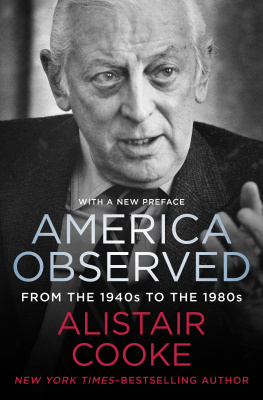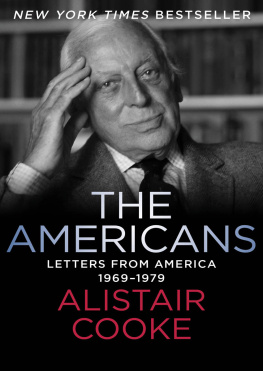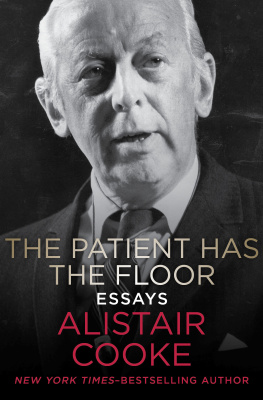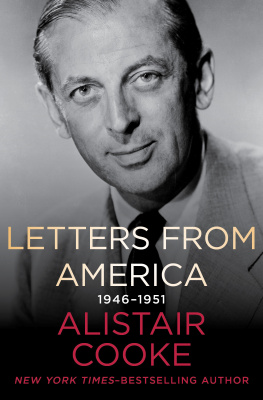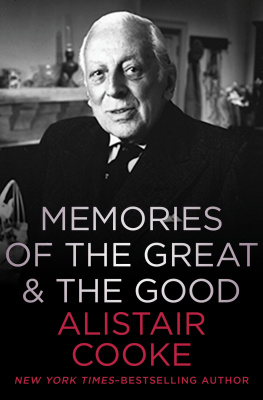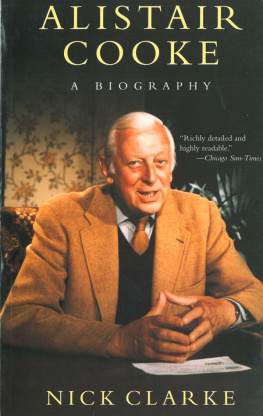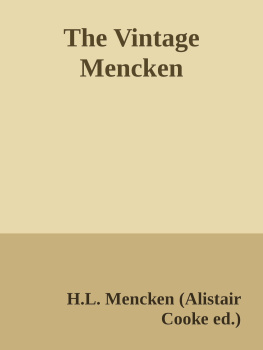Alistair Cooke at the Movies
Edited by GEOFF BROWN

ALLEN LANE
an imprint of
PENGUIN BOOKS
ALLEN LANE
Published by the Penguin Group
Penguin Books Ltd, 80 Strand, London WC2R 0RL , England
Penguin Group (USA) Inc., 375 Hudson Street, New York, New York 10014, USA
Penguin Group (Canada), 90 Eglinton Avenue East, Suite 700, Toronto, Ontario, Canada M4P 2Y3
(a division of Pearson Penguin Canada Inc.)
Penguin Ireland, 25 St Stephens Green, Dublin 2, Ireland
(a division of Penguin Books Ltd)
Penguin Group (Australia), 250 Camberwell Road, Camberwell, Victoria 3124, Australia
(a division of Pearson Australia Group Pty Ltd)
Penguin Books India Pvt Ltd, 11 Community Centre, Panchsheel Park, New Delhi 110 017, India
Penguin Group (NZ), 67 Apollo Drive, Rosedale, North Shore 0632, New Zealand
(a division of Pearson New Zealand Ltd)
Penguin Books (South Africa) (Pty) Ltd, 24 Sturdee Avenue, Rosebank, Johannesburg 2196, South Africa
Penguin Books Ltd, Registered Offices: 80 Strand, London WC2R 0RL , England
www.penguin.com
First published 2009
Copyright The Estate of Alistair Cooke, 2009
Introduction and editorial matter copyright Geoff Brown, 2009
The moral right of the author has been asserted
All rights reserved
Without limiting the rights under copyright reserved above, no part of this publication may be reproduced, stored in or introduced into a retrieval system, or transmitted, in any form or by any means (electronic, mechanical, photocopying, recording or otherwise) without the prior written permission of both the copyright owner and the above publisher of this book
A CIP catalogue record for this book is available from the British Library
ISBN: 978-0-14-195798-2
Contents
List of Illustrations
Introduction
He helped enormously to further English understanding and admiration of the United States, and in doing so he has exposed English apathy and snobbishness in a way that made the air vibrate. I thank him for his fund of anecdotes, for his sparkling parting shots, for his bold penetrating criticisms. His voice has been like a whiff of oxygen in an ether of carbon dioxide.
At a glance, a British reader might date this tribute to Alistair Cooke to his relinquishment of his BBC Letter from America broadcasts in 2004, after almost sixty years. But its not so. G. Allen Battys fan letter to Americas most famous ambassador-at-large was published in the Listener magazine in April 1937, following Cookes departure from his first sustained freelance job, as the BBCs film critic. On 8 October 1934, long before the wider world knew him from his Letter broadcasts, his television series America or his introductions to Masterpiece Theatre, Cooke had sat down at the microphone to give his first BBC talk, broadcast live. He was twenty-five and cocky, fresh from a glittering, cocooned university career at Cambridge, Yale and Harvard. His film stint wasnt without controversy, but, like Mr Batty, the BBC knew they had found a perfect radio voice fluent, conversational, a voice you wanted to listen to. He continued these film broadcasts fortnightly, with summer breaks, until 1937, when he left to live permanently in what had become his promised land: America. Settled in New York, he continued film reviewing on radio stations until the Second World War, when the reporting and interpreting of real lives, real dramas, finally took priority.
Alistair Cookes baptism as a film critic has not been entirely forgotten: through his long career he often drew upon his film knowledge and friendships with Chaplin, Bogart and others. But his film reviews of the 1930s sparkling, quirky have largely slumbered unseen. In 1971, the reissue of Garbo and the Night Watchmen, the enterprising book of reviews he edited in 1937, brought eleven of them back, among coverage by eight other critics. The present collection aims for a much bigger survey, drawing on both British and American radio talks, various magazine writings and Cookes first steps into criticism from his student years at Cambridge. To round out the picture of Cooke at the movies, the anthology then progresses to Cooke the reporter, documenting Hollywood stories and personalities mostly for his BBC listeners and the Guardian newspaper (he was its American correspondent from 1946 to 1972). Finally comes Cooke the portrait artist, capturing in words (mostly in celebration) selected friends and Hollywood personnel. The selection span stretches from 1928 to 2003: an astonishing seventy-five years.
He had first approached the BBC for work in July 1931. An eager, ambitious Cambridge postgraduate student, he grandly announced that he was prepared to give talks on theatre and literary criticism, read fiction and poetry, write review sketches; it was quite a list. Cinema wasnt mentioned, though hed long been a fan and in his early teens had spent many hours in a Blackpool gym hoping to become Douglas Fairbanks. For the Cambridge student magazine The Granta, among other roles (he was eventually its editor), he wrote cinema reviews in the self-absorbed, clotted undergraduate style of the time. In the summer of 1932, out in the real world, his first job was reviewing films for two months for Everyman, a gentle cultural weekly.
A Commonwealth Fund fellowship then transported him to America for the first time, for theatre studies at Yale and Harvard. He also spent time studying American speech, a sport and passion that led to lasting friendship with the philologist and buccaneering journalist H. L. Mencken. But cinema was never forgotten. In 1933, after planning the first of many long car trips exploring the continent, he baited the Observer newspaper in London with the prospect of Hollywood interviews, beginning at the top with Chaplin, though none of his candidates had yet been approached. The Observer bit, the interviewees bit, and Cooke found himself ferried round Hollywood by studio limousines for a string of serious interviews. Cameraman Lee Garmes surprised him with the news that the luxurious foliage of Zoo in Budapest was whipped up in the studio; Katharine Hepburn, on the set of Little Women, surprised him with an ice-cream, a Good Humor bar. A six-part series, Hollywood Prospect, appeared in September and October, with a smaller sequel in 1934. At this point Cooke was no journalist, and not much of an interviewer, though he thought enough of the soberly written encounters to propose repackaging them as a book to T. S. Eliot at the publishers Faber and Faber.
The excursions one concrete, unexpected outcome was Chaplins friendship. Alistairs charm and intelligence struck home. He became an intimate, at dinner, work and play. That enchanted summer, joining Chaplin and his new amour Paulette Goddard on their yacht, the Panacea, he put his new 8mm movie camera to work, shooting what became a little film, All at Sea, long thought lost, but recently rediscovered among Cookes effects. The camera caught Goddards beauty, a harpooned shark, the Pacifics sheen, Chaplins lightning impersonations (among them Garbo, the future Edward VIII, Janet Gaynor and the Greek god Pan) and AC himself, sleek and gangling, accidentally swiping Chaplins face with his pipe. The pairs friendship deepened during 1934 when Cooke, on a second visit to California, worked on the script for a film about Napoleon long rumbling in Chaplins mind, as well as a short burlesque planned to support what eventually became Modern Times. Shortly before, in April, through fast manoeuvring and a successful test in London, he had secured the BBC niche he had long wanted, as the Corporations new film critic. He was replacing Oliver Baldwin (the son of Prime Minister Stanley Baldwin) relieved of his post after he gave a withering public speech attacking Corporation bureaucracy. That summer, letters to Cookes future BBC employers announced his address as c/o Charles Chaplin Studio. They must have been suitably impressed.


